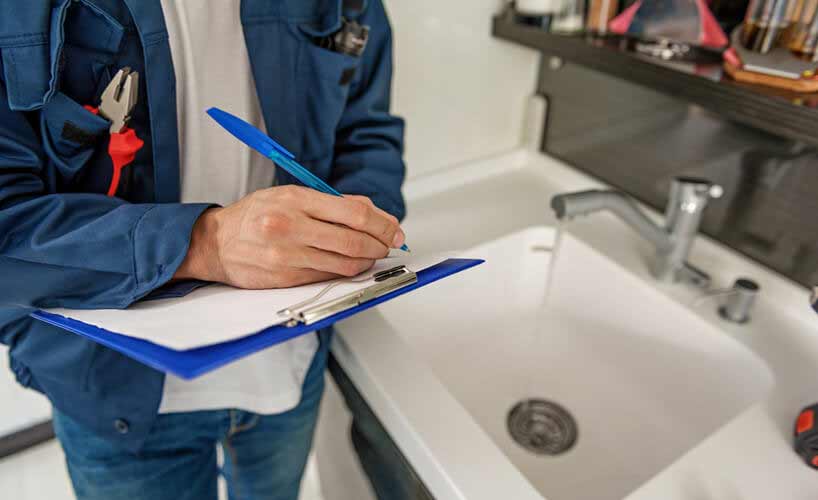Disclosure:
This content, except as otherwise indicated or stated on this site, is the property of TransUnion Rental Screening Solutions, Inc. This content is for educational purposes and for convenience only. Trademarks used are the property of their respective owners, and no endorsement or affiliation is implied. The information presented in this content is “as is” without warranties of any kind, and specifically is not represented to be complete and does not constitute legal advice, and is subject to change without notice. You are encouraged to check these terms from time to time for changes, and by accessing this site you agree to these terms and all terms listed. Laws and regulations may vary by state and locality. Consult your own counsel if you have legal questions related to your rental property practices and processes.
As a landlord, performing property inspections is an important part of your job. Even if you have a great tenant, routine inspections can help prevent big problems down the road. They also indicate to a tenant the type of condition you expect the property to be returned in. After all, if you don’t care about the property, why should they?
A good landlord-tenant relationship involves cooperation and communication, and this especially applies to handling a rental property inspections. Here are some tips on when to perform one, how to do so while protecting tenant privacy, and the do's and don'ts you should know when performing a property inspection.
What is a rental property inspection?
According to Zillow, a rental property inspection is a good way to track the condition of your property. It involves the landlord or the property manager periodically reviewing the property inside and out to assess the condition of the property. A rental property inspection is often conducted while the tenant is present so they are informed of any issues or concerns that arise.
A rental property inspection allows for you and your tenant to review the condition of the property before they move in, and sets the expectation of the condition in which it should be returned. It’s also an opportunity for you to fix any previously unnoticed repairs before the tenant moves in, which sets the stage for a positive professional relationship with your tenant.
Why is it important to perform one?
Performing a rental property inspection helps you to maintain the condition of your property. According to The Balance, inspections can help you account for any deductions taken from the tenant's security deposit if they damage the property. So having a clear view of the property’s condition before your tenant moves in and when they move out is important to managing your property.

When should you perform one?
BiggerPockets recommends four types of inspections that you should conduct on your property:
- Move-in inspection - This inspection should be conducted by you and the tenant during the move-in process. Some landlords use a move-in checklist to document any issues with the property, and then ask the tenant to sign and date the form. Some landlords also find it helpful to take photos of any existing damage to keep along with the paperwork.
- Move-out inspection - This inspection helps you determine the condition of the property when the tenant leaves. easyProperty notes that you’ll want to schedule the walk-through on the day your tenants vacate the premises. If you do it too early, they may cause damage during the last few days on the property or in the process of moving out. For example, hardwood floors can easily be scratched while moving heavy furniture. If you do it too late, the tenants may be able to claim that the damage was not caused by them.
- Routine inspection - This inspection should be conducted every three to six months to ensure that the property is still in top condition. It allows you to stay on top of maintenance issues that are your responsibility, and gives tenants a chance to correct any damage they have caused before it gets worse.
- Drive-by inspection - This inspection doesn’t require advanced notification, since you’re not entering the property. You’re simply observing if there are any issues on the outside of the property that would indicate a routine inspection is in order.

How to Perform a Rental Property Inspection: Do’s and Don’ts
There are laws that protect renters’ legal rights when it comes to inspections, so you’ll want to make sure you’re acting accordingly. Consult with an attorney or legal aid source to identify what laws might apply to your inspections. These do’s and don’ts will help keep your tenant happy, meaning less chance of an early tenant turnover. Some issues you should consider:
- Do give prior notice - Be sure you are aware of the laws governing the amount of notice required before an inspection. You may want to consult an attorney or other legal source in order to understand your obligations.
- Do encourage your tenant to be at home - BiggerPockets recommends that you have tenants sign documentation about the condition of the property. This gives you a chance to talk to your tenant about any needed repairs, or point out damages they will need to fix before the lease runs out.
- Do explain why the inspection is necessary - Providing a reason for your visit helps the tenant understand that it benefits you as well as them.
- Don't photograph personal items - While some landlords support written documentation with photos, Zillow recommends keeping the tenants’ pets out of the picture. It’s a good idea to leave identifiable personal items out of the picture to protect a tenant’s privacy. This includes people, pets, and pictures, as well as valuable items like computers.
- Don’t engage in confrontation with tenants - Landlords take pride in their property, so it can be hard not to take it personally if you notice neglect or damages. If the tenant has complaints, The Balance points out that you should remain calm and professional. Any problems should be addressed in writing instead of verbally.
Walking through the property with your tenant gives you the opportunity to give them advance notice of any deductions, or provide the tenant with time to remedy the damage. Nolo provides a list showing which repair costs can be deducted from a tenant’s security deposit, and which fall into the ordinary wear and tear category.
A tenant move-in and move-out checklist helps you to account for any deductions taken from the tenant’s security deposit, if they do cause damage to the property.
Conclusion
The reason for performing rental property inspections throughout the rental relationship is to protect yourself and your assets. It can help you retain some or all of a tenant’s security deposit in order to pay for repairs.
Owning a rental property invariably comes with risks such as property damage, evictions, renter turnover and long vacancies. However, one of the best ways to protect your property from expensive damages is to conduct a thorough tenant screening. Understanding how to screen your tenants will help you be better informed when choosing your next renters.
TransUnion SmartMove online tenant screening and a thorough landlord credit check for tenants can help you pick reliable tenants that are less likely to cause damage to your property. If your tenant has good credit and a clean criminal and eviction record, you have several indicators that they will pay their rent on time and treat your property with respect. It's also beneficial to contact prior landlords and perform reference checks to see if they left their previous unit in good condition.
Know your applicant.
Additional Disclosure:
The information posted to this blog was accurate at the time it was initially published. We do not continue to guarantee the accuracy or completeness of the information provided. The information contained in the TransUnion Rental Screening Services, Inc. blog is provided for educational purposes only and does not constitute legal or financial advice. You should consult your own attorney or financial adviser regarding your particular situation. For complete details of any product mentioned, visit www.transunion.com. This site is governed by the TransUnion Rental Screening Privacy Policy Privacy Notice located at TransUnion Rental Screening Solutions, Inc. Privacy Notice | TransUnion.



